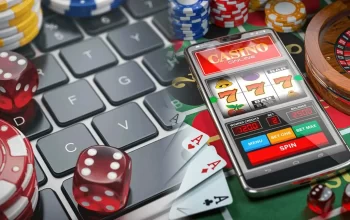Financial market professionals often hear criticism that “it’s all gambling”. While much truth can be found in that statement, it is crucial that professionals in financial markets differentiate between investments, insurance and gambling activities.
Gambling increases the range of possible outcomes while insurance decreases it, creating an easy distinction between their typical results.
What is gambling?
Gambling involves betting something of value – often money – on an event with uncertain outcomes in order to increase one’s chance of winning something valuable in return. Gambling takes place in casinos, lotteries, online platforms or private settings and may be legal or illegal depending on where it takes place.
Gambling problems can quickly spiral out of control, spending more than they have and concealing their spending habits from family and friends. They may even steal to finance their gambling addiction – serious harm can come from gambling problems in any walk of life and anyone at any age.
One is considered to have a gambling problem when they:
What is insurance?
Insurance is a form of risk management in which insurers take on risk in exchange for payment. Insurance companies utilize applied statistics to calculate how much to spend on expected losses while maintaining enough of a margin to prevent expenses outpacing revenue, making insurance something other than gambling.
Insurance and gambling do share certain similarities. Both rely on odds to create potential outcomes, although unlike gambling, insurance actually narrows this range; most who purchase it incur a small cost (in the form of premiums) in exchange for peace of mind knowing their house won’t burn down.
Insurance differs from gambling in that it involves an insurable interest and relies upon trust between parties involved – which explains why coffee shop entrepreneur Edward Lloyd was able to create an insurance company which provided protection from various perils – including death – at such short notice.
What is the difference between the two?
People often struggle to distinguish the differences between insurance and gambling, since both involve investing money with the hope of potential gain. There are, however, key distinctions. Gambling creates new speculative risk while insurance transfers existing pure risk; for example, betting $500 on a horse race creates the risk of potentially losing it all while buying homeowners policy transfers that risk to an insurer instead.
Insurance companies understand how many policies will need to be paid out, making their returns less volatile than casino companies. Furthermore, good faith contracts for insurance are required while it isn’t. All these differences explain why insurance returns on investments outpace casino ones.
Which is better?
Gambling and insurance both involve risk, with gambling increasing it while insurance reduces it. Because of this difference, some people enjoy gambling while others opt not to gamble at all and instead obtain insurance policies instead.
Gambling and insurance may seem similar at first glance; both require careful thought, risk assessment, and an exciting prize at stake. Many individuals find it hard to distinguish the two. This may be because both require consideration, chance and a potential win-win outcome.
Another factor contributing to their confusion between gambling and insurance purchasing may be related to financial outcomes: most gamblers and purchasers of insurance typically lose money.
But it is vitally important that we distinguish between insurance and gambling due to its ramifications for how we invest our money. Particularly crucial is understanding the difference between an investment return and that from betting; bets may offer similar returns but often lead to false assurance and lead people down paths that may not always be in their best interest.




